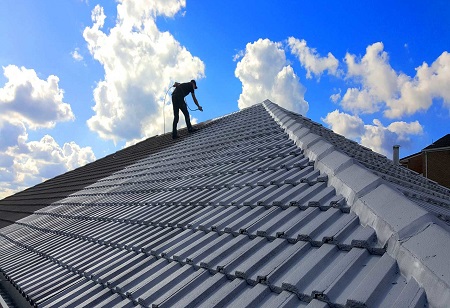In the past decade, the Indian
roofing segment has been through a paradigm shift. Primarily attributed to two possible reasons — growth in industrial applications, and demand to move away from conventional processes — the development led to higher demand for different types of sheets that delivers better protection for the roof and wall establishments.
Rapid urbanization in a match with shifting consumer preferences from traditional roofing materials is expected to provide a boost to the Indian roofing market. Multiple reports forecast the roofing market to reach USD 14.07 billion by 2027.
New advanced materials are now taking a centre stage. For instance, owing to the low maintenance costs, easy to install features; polycarbonate roofing sheets are becoming popular in industrial and large commercial buildings. Alongside this, the rising demand of clear roofing panel can also be noted in the patios and sunrooms. Whereas, the rising environmental concerns are considerably increasing the demand for sustainable products like zinc-aluminum coated sheets, and more.
In this article, we have enlisted the top trends in the roofing industry that are set to transform the market in the future.
Eco-friendly Roofing Solutions
The concept of environmentally-friendly operations is now commonly acknowledged across all industrial sectors and roofing, contracting, and construction is no different. A report by United Nations Environment Program states that buildings and their construction processes account for 36 percent of global energy use and 39 percent of energy-related carbon dioxide emissions annually.
In regard to these, two specific categories of eco-friendly roofing are now witnessing a comprehensive rise – metal and solar roofing. More specifically, metal roofing has seen an upswing in popularity in recent years owing to visual appeal, high durability, and functionality.
Whereas, solar roofing has received an increased interest owing to its photovoltaic shingles that have the ability to utilize solar energy for the home or building, while also playing the part of normal roof shingles.
Although eco-friendly roofing alternatives bring significant benefits to the table, it is also crucial for roofers to stress on potential negatives that come with this type of solution.
Synthetic and Silicon-based Materials
Rapid advancements in roofing technology have resulted in the development of unique synthetic compound-based materials that are both lightweight, robust, and extremely long-lasting.
Owing to its advanced properties, synthetic roofing material has significantly grown in popularity. For instance, polyurethane, a form of a polymer composed of organic unit chains, is a common component of synthetic roofing with a lifespan of 50 years has risen to prominence across all the industrial sectors.
On the other hand, silicon roof coating is another type of solution that has been majorly used in commercial roofing. However, silicon roof solutions are also witnessing a rise in the residential segments. Silicon either in roll or spray form is applied over an already-established layer of roofing materials.
Embracing Newe technology
Technology has given a rapid boost to the roofing industry. Today, cutting-edge technologies are leveraged by roofing providers to ensure the quality of the service. Technologies like drones are expected to witness a surge in the roofing industry. It might be used to address multiple complicated tasks like identifying damages in the project and also its progression.
Storm and hail tracking applications have also proven to be quite helpful in generating possible new business, and it is anticipated that they will continue to advance to support roofers in staying ahead of impending weather.
Roofing apps include apps for business management and customer relationship management (CRM) and apps for selling (estimating and measuring). CRM applications are essential for maintaining strong relationships with customers throughout the roofing project lifecycle. These apps help contractors keep track of customer information, communication history, project details, and follow-up tasks.
Business management apps are designed to streamline various aspects of running a roofing business. They typically include project management, scheduling, invoicing, inventory management, and accounting. By centralizing these tasks into a single platform, business owners can effectively manage their operations and improve overall productivity.
Sales apps are specifically designed to streamline the sales process for roofing contractors. They often include features such as estimating, quoting, and measuring tools to help contractors accurately assess project requirements and provide clients with detailed proposals. Sales apps also enable contractors to create professional presentations, generate quotes on-site, and quickly respond to customer inquiries, ultimately improving sales efficiency and closing rates.
Safety is paramount in the roofing industry, and specialized applications are available to help contractors ensure compliance with safety regulations and standards. These apps provide access to safety guidelines, training materials, inspection checklists, and incident reporting tools. By prioritizing safety and compliance, roofing companies can minimize workplace accidents, reduce liabilities, and protect their reputation.
Technology is also being induced in the areas like – measurement. For example – Roofr a sales platform uses satellite and high-definition aerial images for calculating measurements with industry-leading accuracy. It can also be implemented to calculate expenses and build out a comprehensive report for the customers.
A way for New Materials
The coming days bear promising growth for the new type of materials like — fibreglass, asphalt, and metal roofing options. There also has been a considerable rise in the quality of the clip-on systems, fasteners, trimming, and hardware fixings to make roofing structures look neater while leveling up their robustness.
Changes in the buyer's buying pattern can also be noted as they look for innovative shapes, longer-life spans,s and roofs with FRP skylights. Tiles and shingles are trending too; thereby making fiberglass and metal roofs an important part of residential and commercial setups in India.
